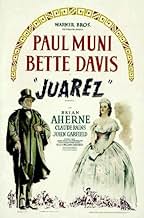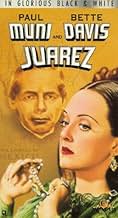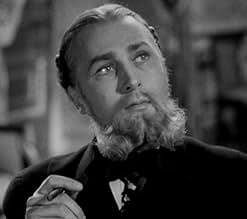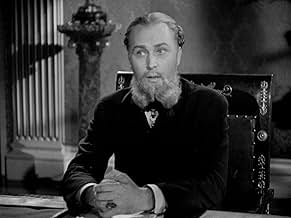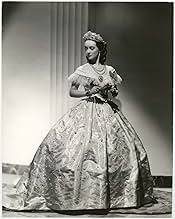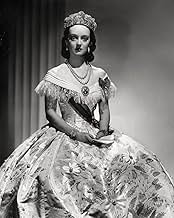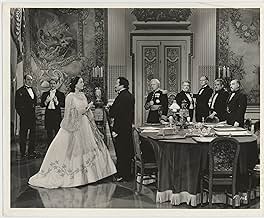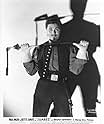Juarez
- 1939
- Tous publics
- 2h 5min
NOTE IMDb
6,9/10
2,6 k
MA NOTE
Louis Napoléon III profite de la guerre civile américaine pour contourner la doctrine Monroe et étendre son pouvoir en aidant l'empereur Maximilian Habsbourg à ajouter le Mexique à son empir... Tout lireLouis Napoléon III profite de la guerre civile américaine pour contourner la doctrine Monroe et étendre son pouvoir en aidant l'empereur Maximilian Habsbourg à ajouter le Mexique à son empire.Louis Napoléon III profite de la guerre civile américaine pour contourner la doctrine Monroe et étendre son pouvoir en aidant l'empereur Maximilian Habsbourg à ajouter le Mexique à son empire.
- Nommé pour 1 Oscar
- 1 victoire et 1 nomination au total
Histoire
Le saviez-vous
- AnecdotesBecause the film shows a number of Maximilian's generals to be Mexican, many viewers attribute it to typical Hollywood historical distortions. It is, however, indeed accurate. It's a little-known fact that, although Maximilian was eventually overthrown and executed by Mexican revolutionaries, there were more Mexicans fighting on Maximilian's side than against him. This was due in large part to the Catholic Church's strong support of the French occupation of Mexico and its encouraging of Mexican Catholics to fight against the revolutionary forces by joining Maximilian's army, which they did in large numbers.
- GaffesWhen Napoleon III is informed in a letter that Robert E. Lee has been defeated at Gettysburg, he responds by paraphrasing Lincoln's famous Gettysburg Address by calling democracy as government for the people, by the people, etc. He couldn't have known Lincoln's speech flourish because it wasn't given until November 19, 1863, more than four months after the battle.
- Citations
Emperor Louis Napoleon III: Democracy! Government of the cattle, by the cattle, for the cattle!
- Versions alternativesIn 1952, the film was re-released and several key scenes were removed, particularly sequences that contained dialogue that criticized countries which, in 1939 had been regarded as totalitarian, but which, by the early 1950s had become Cold War allies of the United States and could therefore no longer be criticized as imperialist adventurers. Germany and Italy, especially, former enemies in the 1940s, were now the cornerstone of NATO. The removal of these scenes obfuscated the narrative considerably, in particular, removing any clear reasons behind the execution of the Emperor Maximilian at the conclusion of the film. This revised print runs 106 minutes and is the version released on video and generally available today. The 1939 version is preserved on nitrate stock in the Warner Archive.
- ConnexionsFeatured in Hollywood and the Stars: The Angry Screen (1964)
- Bandes originalesMy Country Tis of Thee
(uncredited)
Music attributed to Henry Carey (1744)
Played as part of the score when America is mentioned
Commentaire à la une
Although there are some mistakes historically speaking,this is an absorbing screenplay,with superlative performances by Paul Muni,Bette Davis and Brian Aherne,who should have been at the top of the bill too,for he has more scenes than his two co-stars.
Muni is almost frightening with his impassive face and his slow delivery.If looks could kill,his certainly would...
Davis ,although she does not look like Charlotte physically ,gives a captivating portrayal of the empress.The scene when she prays Virgin Mary is impressive ,but not true: she was not sterile,but she and the emperor used to sleep apart!Their relationship was much more complex than the one depicted by Dieterlé: actually,the emperor was often away,it seemed that their strange love worked from a distance.Little by little,Maximilian lost all interest in power and Charlotte was ruling while he was gone (which often happened)or was staying in his Cuernavaca "paradise" .
Aherne is Maximilian in the flesh.It's interesting to notice that his brother Francis-Joseph had deprived him of all his rights and his titles in Austria.Historians generally agree that he would not have accepted the Mexican throne,if Charlotte had not been his wife. the problem is that the film doesn't show us the couple BEFORE they get to Mexico:one thing to bear in mind is that Max did not accept the throne overnight;and many people in Europa (notably Queen Victoria and Empress Elizabeth aka "Sissi" ) had warned them it was more a curse than a blessing.Charlotte (Carlotta) ,someone reportedly said ,wanted to reign over any people anywhere.Sissi called her Max's black angel. Maximilian is depicted as a chivalrous noble sovereign which he was in a way.But of course ,he had lots of (Mexican)lovers since he didn't sleep with his wife
Dieterlé does not pass over in silence the obnoxious role played by Napoleon the Third (and wife Eugénie de Montijo).Charlotte does show her contempt:"He is an impostor,his family is not an old one like ours ".The famous scene of the orangeade is included .Today,no serious historian would put forward that the drink was poisoned.But it might be possible that she was poisoned before leaving Mexico.Davis shines when she plays these scenes of madness.The scenes in Paris are not thoroughly accurate though:Eugenie (an incredibly beautiful Sondergaard) met first Carlotta alone in the Grand Hotel -they did not invite her to the Tuileries,which meant a lot about what they felt-Metternich was not the person who helped Carlotta :she first took refuge in the Vatican where the pope had trouble to get rid of her,then her sister-in-law Marie -Henriette ,queen of Belgium,came to her rescue when she was treated almost like a prisoner in Miramar.
All that concerns Maximilian's death is accurate ,his last words were "poor Charlotte!"
Poor Charlotte indeed.She was to outlive almost everyone,even Empress Eugenie! She died in 1927,after years and years of insanity with occasional moments of lucidity ,notably during WW1.
Dieterlé's movie is by no means uninteresting,but it would be exciting to film a remake in the light of the recent works about the Mexican adventure.
Muni is almost frightening with his impassive face and his slow delivery.If looks could kill,his certainly would...
Davis ,although she does not look like Charlotte physically ,gives a captivating portrayal of the empress.The scene when she prays Virgin Mary is impressive ,but not true: she was not sterile,but she and the emperor used to sleep apart!Their relationship was much more complex than the one depicted by Dieterlé: actually,the emperor was often away,it seemed that their strange love worked from a distance.Little by little,Maximilian lost all interest in power and Charlotte was ruling while he was gone (which often happened)or was staying in his Cuernavaca "paradise" .
Aherne is Maximilian in the flesh.It's interesting to notice that his brother Francis-Joseph had deprived him of all his rights and his titles in Austria.Historians generally agree that he would not have accepted the Mexican throne,if Charlotte had not been his wife. the problem is that the film doesn't show us the couple BEFORE they get to Mexico:one thing to bear in mind is that Max did not accept the throne overnight;and many people in Europa (notably Queen Victoria and Empress Elizabeth aka "Sissi" ) had warned them it was more a curse than a blessing.Charlotte (Carlotta) ,someone reportedly said ,wanted to reign over any people anywhere.Sissi called her Max's black angel. Maximilian is depicted as a chivalrous noble sovereign which he was in a way.But of course ,he had lots of (Mexican)lovers since he didn't sleep with his wife
Dieterlé does not pass over in silence the obnoxious role played by Napoleon the Third (and wife Eugénie de Montijo).Charlotte does show her contempt:"He is an impostor,his family is not an old one like ours ".The famous scene of the orangeade is included .Today,no serious historian would put forward that the drink was poisoned.But it might be possible that she was poisoned before leaving Mexico.Davis shines when she plays these scenes of madness.The scenes in Paris are not thoroughly accurate though:Eugenie (an incredibly beautiful Sondergaard) met first Carlotta alone in the Grand Hotel -they did not invite her to the Tuileries,which meant a lot about what they felt-Metternich was not the person who helped Carlotta :she first took refuge in the Vatican where the pope had trouble to get rid of her,then her sister-in-law Marie -Henriette ,queen of Belgium,came to her rescue when she was treated almost like a prisoner in Miramar.
All that concerns Maximilian's death is accurate ,his last words were "poor Charlotte!"
Poor Charlotte indeed.She was to outlive almost everyone,even Empress Eugenie! She died in 1927,after years and years of insanity with occasional moments of lucidity ,notably during WW1.
Dieterlé's movie is by no means uninteresting,but it would be exciting to film a remake in the light of the recent works about the Mexican adventure.
- dbdumonteil
- 9 févr. 2007
- Permalien
Meilleurs choix
Connectez-vous pour évaluer et suivre la liste de favoris afin de recevoir des recommandations personnalisées
- How long is Juarez?Alimenté par Alexa
Détails
- Durée2 heures 5 minutes
- Couleur
- Mixage
- Rapport de forme
- 1.37 : 1
Contribuer à cette page
Suggérer une modification ou ajouter du contenu manquant



